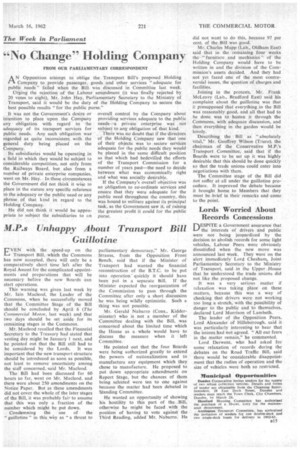M.P.s Unhappy About Transport Bill Guillotine
Page 49

If you've noticed an error in this article please click here to report it so we can fix it.
EVEN with the speed-up on the Transport Bill, which the Commons has now accepted, there will only be a comparatively short time left after the Royal Assent for the complicated appointments and preparations that will be necessary before the new Boards can start operations.
This warning was given last week by Mr. fain Macleod, the Leader of the Commons, when he successfully moved that the Committee Stage of the Bill should be concluded by April 6 (The Commercial Motor, last week) and that two days should be set aside for its remaining stages in the Commons.
Mr. Macleod recalled that the Financial Secretary to the Treasury had stated that vesting day might be January 1 next, and he pointed out that the Bill still had to be considered by the Lords. It was important that the new transport structure should be introduced as soon as possible, not least to remove uncertainty among the staff concerned, 'said Mr. Macleod.
The Bill had been discussed for 60 hours so far, went on Mr. Macleod, and there were about 250 amendments on the Notice Paper. But as these amendments did not cover the whole of the later stages of the Bill, it was probably fair to assume that this was only a fraction of the number which might be put down.
Condemning the use of the " guillotine " in this Way as "a threat to parliamentary democracy," Mr. George Strauss, from the Opposition Front Bench, said that if the Minister of Transport had wanted the financial reconstruction of the B.T.C. to be put into operation' quickly it should have been put in a separate Bill. If the Minister expected the reorganization of the Commission to pass through the Committee after only a short discussion he was being wildly optimistic. Such a thing was not possible.
Mr. Gerald Nabarro (Cons., Kidderminster) who is not a member of the Committee dealing with the Bill, was concerned about the limited time which the House as a whole would have to discuss the measure when it left Committee.
He pointed out that the four Boards were being authorized greatly to extend the powers of nationalization and to manufacture any equipment which they chose to manufacture. He proposed to put 'down appropriate amendments on Report Stage, but the chances of them being selected were ten to one against because the matter had been debated in Standing Committee.
He wanted an opportunity of showing his hostility to this part of the .Bill. otherwise he might he faced with the position of having to vote against the Third Reading, added Mr. Nabarro. He did not want to do this, because 97 per cent, of the Bill was good.
Mr. Charles Mapp (Lab., Oldham East) said that in the remaining four weeks the " furniture , and mechanics" of the Holding . Company would have to be written in and the division of the Commission's assets decided. And they had not yet faced one of the most controversial issues, the question of charges and facilities.
Joining in the protests, Mr. Frank MeLeavy (Lab., Bradford East) said his complaint about the guillotine was that it presupposed that everything in the Bill was reasonably good, and all that had to be done was to hasten it through the Commons, With adequate discussion, and then everything in the garden would be
lovely. .
Describing the Bill as "absolutely vital," Mr. Geoffrey. Wilson (Truro), the chairman of the Conservative M.P.'s Transport Committee, said that if the Boards were to be set up it was highly desirable that this should be done quickly so that the trade unions could enter into negotiations with them.
The Committee stage of the Bill did not suffer at all under the guillotine procedure. It improved the debate because it . brought home to Members that they must be brief in their remarks and come to the point.




















































































































